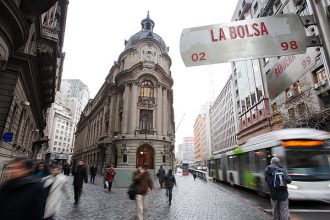Manuel Cruzat Infante and Jorge Said Yarur, well-known entrepreneurs in the Chilean market, felt overlooked in cases related to bankruptcy proceedings. The first of them, after failing to find a logical explanation for his judicial setbacks, began to investigate.
After questioning, requesting information, searching, and questioning the processes, he came to a conclusion: he suspects that there was foul play. Or, in other words, that computer sabotage occurred to alter the algorithm of the Judicial Power.
Specifically, they point to the case distribution system, which operates to assign a court among judges of equal competence. In particular, Cruzat claims that the appointments for the bankruptcy of Curauma S.A. and also the Transnational Insolvency of Latam did not comply with the prescribed protocols.
And they suspect three coincidences: both are cases of high public profile; they were seen by the same court; and with the same lawyers, Cristóbal Eyzaguirre and José Miguel Huerta, from the Claro & Cía law firm. Both attorneys represented the interests of LATAM and, in the Curauma bankruptcy, represented the interests of Euroamérica Seguros de Vida.
Cruzat argues that the case distribution system in the Curauma S.A. bankruptcy and the appointment of the court for the Transnational Insolvency of LATAM did not comply with the prescribed protocols since both were assigned to the 2nd Civil Court of Santiago, even though – according to the criteria set by the Judicial Power – they should have been reviewed by the 6th Civil Court and 15th Civil Court, respectively.
Cruzat explains this in a computer crimes complaint filed last November before the 7th Guarantee Court of Santiago, to which Said subsequently joined, both sponsored by the former National Prosecutor Sabas Chahuán and lawyer Jesica Torres.
Both presentations emphasize the same point: the possibility that both independent cases ended up in the same court is 1.75 in 1,000; that is, the equivalent of drawing a specific card from a deck of 571 cards that do not repeat. This led them to request information about how these cases were distributed to the 2nd Civil Court of Santiago.
And, in their search for answers, they came across some surprises.
SUSPICION AFTER SUSPICION
It all started in December 2013, almost 10 years ago, when the bankruptcy of Curauma S.A., a company controlled by Cruzat, began. From the beginning, his advisers pointed to strange movements. Although the judicial agreement began in Valparaíso, a third party eventually requested bankruptcy in Santiago, so it ended up assigned to the capital’s court.
In that court, César Millán Nicolet was appointed as the bankruptcy trustee, who did not live in Chile, and when he began his actions, he handed over the most valuable Curauma lands to Euroamerica, with whom they had a dispute over those properties.
According to Cruzat, he did not even wait for the first Creditors’ Meeting, so the trustee was subsequently sanctioned for reckless conduct.
He adds another episode, in 2015, as part of the litigation with Euroamerica, where the judge of the Santiago Court, Cecilia González Diez, declared a disqualification. However, she still heard the case at the hearing.
Jesica Torres, the lawyer for the complainants, emphasizes to BBCL Investiga that «this issue is tremendously important and serious. It deserves a thorough study and investigation. It jeopardizes the functionality and compliance with the minimum standards of justice that every democracy should have, such as guaranteeing that all citizens have the right to an impartial and fair judge and not one chosen by appointment, not one that can even be bought.»
Specifically, she points out that «there must be an investigation to clarify this. It cannot be allowed in this country that people can choose the court that suits them best, for reasons, I insist, either due to favoritism or purely corrupt reasons. Whatever the cause, the fact itself is serious, and the authorities are called upon to investigate deeply and collaborate with this investigation and clarify it thoroughly.»
SAID TAKES ACTION
After Cruzat’s attack and the evidence he presented, Said also joined the complaint. In his presentation, as a minority shareholder of LATAM (0.21%), he relates that he once had more than 1.1 million shares.
However, his participation was dramatically reduced to just 300 shares after Latam decided to initiate insolvency proceedings in New York, known as Chapter 11. In Chile, on the other hand, the airline initiated its cross-border insolvency process in the 2nd Civil Court of Santiago, under the representation of the aforementioned lawyers Eyzaguirre and Huerta.
In this context, Said attempted to become part of the process, but the relevant court rejected the request to include him as an independent third party. In other words, they excluded him from the process, even though he was a shareholder with pending legal proceedings against Latam. In his view, it was an inexplicable decision.
He decided to appeal, but his appeal was declared inadmissible by the Santiago Court, whose resolution was signed, among others, by Inelie Durán Madina, the same judge in the Curauma case, criticized by Cruzat for her performance in that bankruptcy when she was the head of the 2nd Civil Court of Santiago. Thus, in his second attempt, he was also excluded from the case.
For these and other reasons, he decided to join the complaint, «as there are many coincidences regarding resolutions issued in both cases, including the participation of similar lawyers in both cases, which necessitate a deeper investigation,» he states in the complaint.
(UN)REASONABLE CRITERIA
The suspicions are primarily based on the fact that the criteria for case assignment were not met.
Through several presentations requested by the complainant, the Judicial Power responded with an official statement and clarified the standards. However, it did not clarify how, based on these standards, the result was so different in the cases of Curauma and Latam.
The assignment criteria are as follows:
Criterion 1: Courts associated with a locality that are qualified to receive the corresponding matter, in this case, bankruptcy, are filtered.
Criterion 2: The case is assigned to the court with the least number of entries for that matter.
Criterion 3: In case there is more than one court with the same minimum number, the case will be distributed to the court with the lowest total number of entries.
In the case of Curauma, there were 19 candidate courts with the lowest number of «Bankruptcy Declaration» cases, each with 5 cases in this matter. In other words, each court had a 5.26% chance of being randomly assigned the case.
Given this wide tie, the court with the fewest cases – of all matters – was the 6th Civil Court of Santiago, with 14,027 cases. However, according to the complainant, this last criterion was not met, as for some reason, the case ended up in the 2nd Civil Court of Santiago.
For the Latam case, the situation is similar. It was the first case to enter Santiago with the «Cross-Border Insolvency» matter, so all courts had zero (0) entries for this matter. Therefore, all courts were candidates (30 possible courts).
And among them, the one with the fewest assigned cases was the 15th Civil Court of Santiago, with 8,618 cases. In other words, it was also incorrectly assigned since it ended up in the 2nd Civil Court of Santiago as well.
At least, that is how the Judicial Power responded in an official statement on April 11, 2022. However, in another subsequent statement on May 23, 2022, regarding criterion 3, regarding which court had the fewest entries, they stated – ambiguously – «this circumstance is not considered a criterion when distributing a case.»
LAWYERS DENY COMPUTER SABOTAGE
When asked about the matter, the Corporation for Judicial Power Assistance (PJUD) declined to comment, as it is an ongoing investigation.
Meanwhile, Cristóbal Eyzaguirre, one of the mentioned lawyers, defended himself against the accusations: «This is an old issue. And it makes no sense at all,» he said.
In his opinion, «no one can interfere with the distribution system,» and «if someone wanted to choose a court, they would do so thinking that the judge in the same court might be favorable to them. Not by mere coincidence of the court number.»
In this case, «the judges who saw both cases are different. This demonstrates the absurdity of what they are claiming. If someone were looking for a court (which cannot be done), they would look for the judge. The court number is logically irrelevant,» he emphasized.
In conclusion, Eyzaguirre stated, «this is a desperate attempt by Cruzat, who has been at this for years, trying to reverse the effects of the Curauma bankruptcy, which harmed many creditors, including the Chilean government.»
Published by BBCL (www.biobiochile.cl), 5th September 2023.





